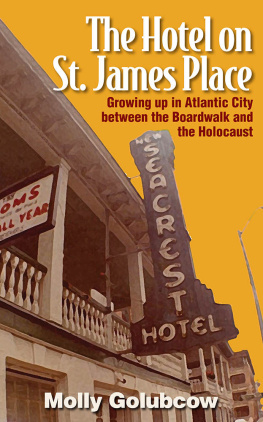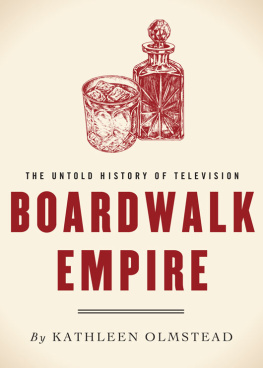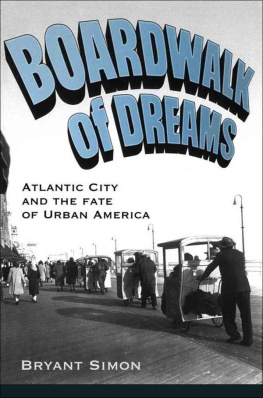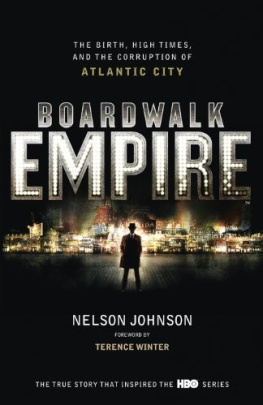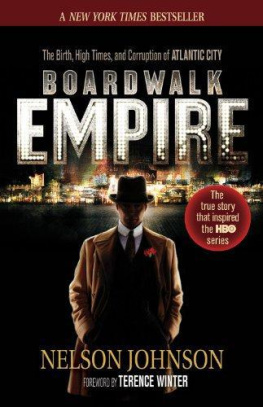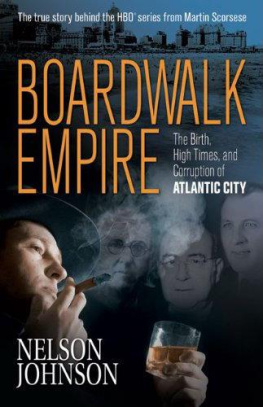Molly Golubcow - The Hotel on St. James Place: Growing up in Atlantic City between the Boardwalk and the Holocaust
Here you can read online Molly Golubcow - The Hotel on St. James Place: Growing up in Atlantic City between the Boardwalk and the Holocaust full text of the book (entire story) in english for free. Download pdf and epub, get meaning, cover and reviews about this ebook. year: 2020, publisher: Bartleby Press, genre: Home and family. Description of the work, (preface) as well as reviews are available. Best literature library LitArk.com created for fans of good reading and offers a wide selection of genres:
Romance novel
Science fiction
Adventure
Detective
Science
History
Home and family
Prose
Art
Politics
Computer
Non-fiction
Religion
Business
Children
Humor
Choose a favorite category and find really read worthwhile books. Enjoy immersion in the world of imagination, feel the emotions of the characters or learn something new for yourself, make an fascinating discovery.
- Book:The Hotel on St. James Place: Growing up in Atlantic City between the Boardwalk and the Holocaust
- Author:
- Publisher:Bartleby Press
- Genre:
- Year:2020
- Rating:4 / 5
- Favourites:Add to favourites
- Your mark:
- 80
- 1
- 2
- 3
- 4
- 5
The Hotel on St. James Place: Growing up in Atlantic City between the Boardwalk and the Holocaust: summary, description and annotation
We offer to read an annotation, description, summary or preface (depends on what the author of the book "The Hotel on St. James Place: Growing up in Atlantic City between the Boardwalk and the Holocaust" wrote himself). If you haven't found the necessary information about the book — write in the comments, we will try to find it.
Molly Golubcow: author's other books
Who wrote The Hotel on St. James Place: Growing up in Atlantic City between the Boardwalk and the Holocaust? Find out the surname, the name of the author of the book and a list of all author's works by series.
The Hotel on St. James Place: Growing up in Atlantic City between the Boardwalk and the Holocaust — read online for free the complete book (whole text) full work
Below is the text of the book, divided by pages. System saving the place of the last page read, allows you to conveniently read the book "The Hotel on St. James Place: Growing up in Atlantic City between the Boardwalk and the Holocaust" online for free, without having to search again every time where you left off. Put a bookmark, and you can go to the page where you finished reading at any time.
Font size:
Interval:
Bookmark:
The Hotel on
St. James Place
Growing up in Atlantic City
between the Boardwalk
and the Holocaust
Molly Golubcow

Copyright 2021 by Molly Golubcow
All rights reserved. No part of this book may be used or reproduced in any form whatsoever without written permission, except in the case of brief quotations embodied in critical reviews and articles.
ISBN 978-0935437-57-7
Library of Congress Control Number: 2020947058
Cover design by Ross Feldner
Published by:
Bartleby Press
PO Box 858
Savage, Maryland 20763
800-953-9929
www.BartlebythePublisher.com
Printed in the United States of America
For my parents, Harry and Sonia Estrov Golubcow
Contents
Chapter One
Fisher & Scootie
A s the owner of a small hotel, frequented by lost souls who had a little bit of money and maybe a police record or two, my father sat behind the high-gloss lacquered desk of the New Seacrest Hotel in Atlantic City, New Jersey. With his head slightly tilted and chin cupped in his right hand, he tried not to fall asleep late at night. It never dawned on me then that my father didnt seem to need sleep like the rest of ushorizontal, under covers, tucked away safe and sound. My friends would ask him with teasing curiosity, Mr. G, when do you ever go to sleep? To which he would always reply in his own Yiddish version of English: In the vinter time after the summer ven business is slow, I vill sleep.
It was making a joke, but there was something dark behind the humor. Never really a sound sleeper, regardless of the season, the night provided too many opportunities for my father to again see the horrors. Families, along with his own, children, mothers, teachers, neighbors, an entire ghetto showered upon by a downpour of machine gun fire conducted by the wave of a leather-gloved hand of the SS. Then, the spraying of bullets and the screaming. Most were instantly dead, others slowly dying, and a handful of livingscattered and blood-drenched without a damn of protection from the heavens or a single human being.
In the Spring of 1945, twenty-five years before my father sat sentry at the Seacrest Hotel, Hitler cyanided his prize shepherd, Blondi, a final shame to add to his long list, before he and wife Ava partook of the same poison. The war had finally ended, leaving the survivors to sort through the wreckage of their lives and memories; at least try to make sense of unspeakable days, months, and years full of humanity sinking ever lower. They resolved to never forget the 6 million Jews murdered. And, vowed to go on just to spite the bastards that dreamed of mastering the races in the first place.
For my father, the journey to Atlantic City, New Jersey was not a direct or even desired route from Miory, Poland, a small town 114 miles north of Minsk in present day Belarus.
It began in earnest in 1942 as the ghetto was being eliminated, liquidated, annihilated, and destroyed. Forced to go outside to be counted yet again, the 220 ghetto dwellers were herded out to the open field by the Krukefke woods. And then the events of this day suddenly became clear. Nazis barking out orders to undress, line up. Shnell, Shnell! Children crying, clutching mothers. Aged men reciting the Shema prayer. Tears smoothly rolled down cheeks as a precursor to the blood that would soon flow.
When I was a teenager, I would ask my father about that day. Like a prosecutor, my questions were direct and at times relentless. Why didnt you just punch a Nazi? I would ask. How come a bunch of people didnt just resistfight, push, something?
He would exhale and try to explain a horror that only someone who was there could possibly comprehend. He would lean back into his chair, look straight across the table almost looking beyond me as if he were watching a movie screen and say, Its easy to say when were sitting here what I should have donewhen it happened, we were all like walking dead people alreadyno hope, broken. Most of the time I accepted what seemed an unsatisfying explanation, but left my father to his memories of the last moments with his first family.
That morning, every Jew in Miory recalled the words recited every year in shul at Yom Kippur. Who shall live and who shall die? Who by fire, who by drowning, who by wild beast? Suddenly each word rose from the pages of the holy machzor and took shape. Not a Jewish soul was spared the horror of witnessing words so holy, so routinely said year after year, come to life on a cloudy day in May of 1942. Every Jew stood and watched their judgment instantly administered to the 220.
The long bearded rebbe , the first to be shot against the knurled oak. The Yeshiva bocher who planned to study the words of God for the rest of his life. The tailors daughter who never married because of her clubfoot and now never would. Babies wrapped in blankets crying for milk, children who played their last game of jacks that morning, old men, young lovers, wealthy, poor, wise, ignorant, all fell like paper-crisp leaves in Autumn into the pre-dug mass grave.
Where one body began and another ended was not clearly defined since blood and dirt sullied each persons uniqueness. What was once a small vibrant shtetel morphed into a mass of naked, pale skins on soft baby bellies, gray learned beards, blonde hair like flax, arthritic fingers, and hazel eyes, closed foreverall covered with blood flowing in and out.
My father survived because of God. Not necessarily because of the concept of the almighty but the word God itself. When the purpose of the Nazis and the future of all the naked humiliated souls became clear to him, my father cried out, Mine Gott .
His prayer was immediately answered with a rifle butt to the left side of his head and a response from one of Hitler Youths finest, You have no God, hes ours. He fell to the ground before the bullets began- old, young, good, and even bad souls went up to the heavens en masse.
My father laid unconscious by the giant hole in the ground. When he awoke, nothing was moving; even blood had stopped flowing and began crusting on the dead. He staggered into the dark woods where not even a partial moon shed some light on what had happened and what would happen next. All he knew for certain was that his entire family, part of the exodus direct to heaven that afternoon, left him alive and behind. He spent the rest of the war in those woods with a band of Polish Resistance fighters imagining the touch of his wife, the smile of his teenage daughter, and the sound of his eight-year-old son calling him Tateh .
October of 1945 was the time for survivors to trickle back to wherever home was before the world went mad. And like teenagers at a school dance, those who migrated back to their hometowns awkwardly paired up because mustering all their strength to go on was the only thing they could do. That was how my parents metnot at the shake shop or at a high school dance, like most of my friends parents, but at a gathering of Miory survivors.
My parents knew each other before the war. Miory was such a small town, the Jewish population in 1921 was 371 people. Sonia, my mother, was the second cousin of Malkeh, my fathers first wife. Because of their mutual losses, they and the other survivors spent many evenings reviewing the list of those who perished, where, and how. Bits and pieces of the horror put together the sorry picture15 out of 220 survived. The small group would meet and reminisce, a typical evening in Miory in 1945, about friends and family never to be seen again. And for the living, where to go from here.
As my mother sat one evening with Dvayrel, Bocher, and some of the others who were either lucky or unlucky to have survived, she remembered a beautiful afternoon in Miory and a walk with her cousin Malkeh four years before the war started. The air was crisp; winter was beginning. The two strolled across the wooden bridge over the creek.
Next pageFont size:
Interval:
Bookmark:
Similar books «The Hotel on St. James Place: Growing up in Atlantic City between the Boardwalk and the Holocaust»
Look at similar books to The Hotel on St. James Place: Growing up in Atlantic City between the Boardwalk and the Holocaust. We have selected literature similar in name and meaning in the hope of providing readers with more options to find new, interesting, not yet read works.
Discussion, reviews of the book The Hotel on St. James Place: Growing up in Atlantic City between the Boardwalk and the Holocaust and just readers' own opinions. Leave your comments, write what you think about the work, its meaning or the main characters. Specify what exactly you liked and what you didn't like, and why you think so.

